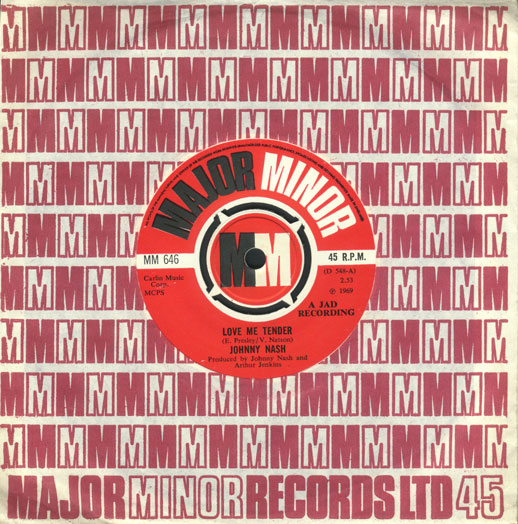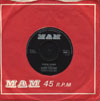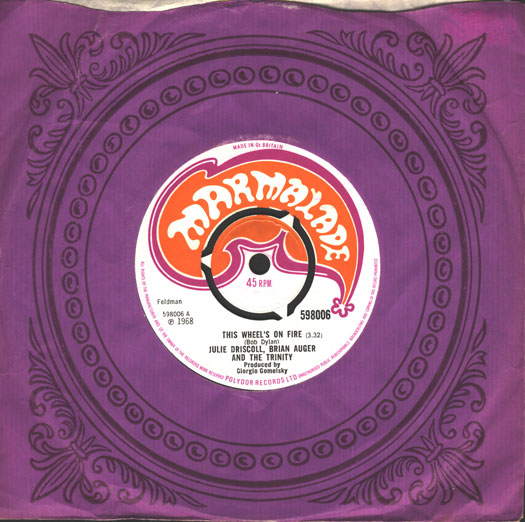|
 -
company sleeves from the 50's to the 80's -
company sleeves from the 50's to the 80's
Click on the images to see a larger version. My comments are bound to be incorrect in places, so please send me
corrections or more info if that's the case. Keep checking back regularly for updates and more scans.
Please do not directly link to these images for your own pages; it won't work.
You require my advance permission to use them; please contact me to make arrangements. The artwork remains copyright of the record company.
Page 4 (London to MCA)
(Previous page) (Back to index) (Next page)
London
To many collectors, London is the ultimate label. Formed by Decca to issue US product, the "American Recordings" series covers so many of the rock 'n' roll and R&B greats, making them among the most collectable of singles. Little Richard, Fats Domino, Johnny Cash, Duane Eddy, Ricky Nelson, Johnny Burnette, the Coasters, the Everly Brothers, the Drifters, Bobby Vee, Roy Orbison - the list goes on! The London name had fallen out of favour by the mid 70s, but later made a comeback for releases from the likes of Bananarama, East 17 and Faith No More. Not quite the same, really! .jpg) .jpg) | | This is the second stripey London sleeve, which retains the same basic design but moves things closer to white. The London text on the label is now usually surrounded by a large silver box and often includes the name of the US company that originally released the song. |
.jpg) .jpg) | | Red spirals here, from the same rebranding that saw parent company Decca sleeves move to a similar blue design, circa 1966. And did you know that Erma Franklin is Aretha's cousin? |
Major Minor
An Irish-based label of the 1960s, Major Minor also released records through Decca distribution channels in the UK. The label's controller, Philip Solomon, was also a director of offshore pirate Radio Caroline, meaning many of the releases were played on the station. Major Minor's output covered both traditional Irish (the Dubliners, the Bachelors) and not-so traditional Irish (David McWilliams and his hit 'The Days Of Pearly Spencer'). The label also had many oddities from licensing: Johnny Nash, the Isley Brothers, but most notable, Serge Gainsbourg and Jane Birkin's "Je T'Aime, Moi Non Plus", which was deleted by Fontana and instead gave Major Minor a UK number 1.   | | This is the standard red-and-white Major Minor sleeve, which housed all of their UK singles in the second half of the 1960s. |
MAM
Management Agency & Music Ltd was set up in 1967 by Robert Mills, Engelbert Humperdinck and Tom Jones, but later moved away from its agency roots to start releasing its own records. Dave Edmund's "I Hear You Knocking" was its first release; its most prolific artist was Gilbert O'Sullivan, who put out twenty singles on the label.   | | The standard MAM sleeve - red background, white box, nothing fancy. |
Marmalade
Like many of the major labels, Polydor consigned its more unusual psychedlic releases to a subsidiary imprint. Marmalade wasn't as long-lived as, say, Harvest or Deram, but it still made its mark with "This Wheel's On Fire" from Julie Driscoll, Brian Auger and The Trinity (a revised version of which was used for the TV series "Absolutely Fabulous").   | | Here's that single in the delicious Marmalade sleeve. Purple swirls, paisley patterns, bubbly font - it perfectly captures the spirit of the music inside. |
MCA
The Music Corporation of America started releasing records in 1962, when it bought the US arm of Decca. Back in the UK, Decca began releasing some of its American product under the MCA label: the first such issue being John Rowles "If I Only Had Time". The name wasn't used as much through the 60s (with the notable exception of Sonny & Cher), with London remaining the preferred brand. In 1974, MCA switched distribution in the UK to EMI: artists then included Steely Dan and Lynyrd Skynyrd. (Strangely enough, the two labels are now together again: UK Decca was sold to Polygram, who were bought by Universal, who also owned MCA.) .jpg) .jpg) | | This simple sleeve design was found on MCA's first UK releases. Note the great swirly effect on the centre label. |
.jpg) .jpg) | | Another of the Decca group's late 60s spiral sleeves; MCA's variant was purple. The centre label is a little incongruous, with an icy blue design. |
.jpg) .jpg) | | When MCA's UK distribution switched from Decca to EMI in 1974, this rather corporate sleeve was used. Plain MCA logos are seen on the sleeve, with the trademark rainbow on the centre label. |
(Previous page) (Back to index) (Next page)
|






.jpg)
.jpg)
.jpg)
.jpg)






.jpg)
.jpg)
.jpg)
.jpg)
.jpg)
.jpg)